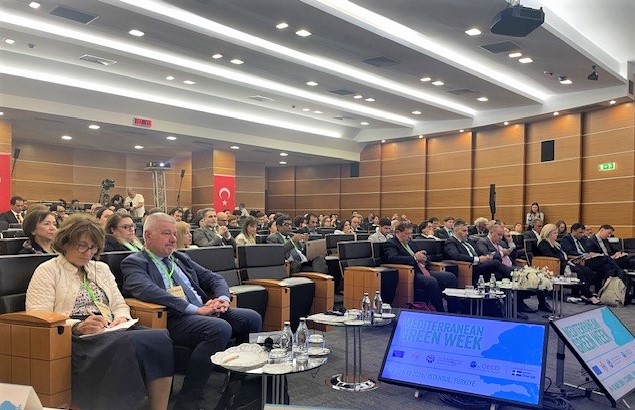In Turkey, representatives of Mediterranean countries are discussing actions that countries need to take to increase climate resilience and water and food security. As Slovenia currently holds the Presidency of the Barcelona Convention for the protection of the Mediterranean, the Slovenian representatives presented the activities and measures being implemented within the framework of the Convention.

The Mediterranean Green Week, organised by the Union for the Mediterranean, focuses on energy, environment and climate action. Maša Kociper, State Secretary from the Prime Minister’s Office, and dr. Mitja Bricelj from the Ministry of Natural Resources and Spatial Planning, as President of the Bureau of the Barcelona Convention, are attending this international event in Turkey, from 14 to 16 May 2024, on behalf of Slovenia, which is currently holding the Presidency of the Barcelona Convention (the Convention for the Protection of the Marine Environment and the Coastal Region of the Mediterranean).
In the opening high-level panel, State Secretary Maša Kociper highlighted three key activities that will contribute to greater resilience to climate change and to improved water and food security. Countries need to accelerate the transition to a green and blue economy, implement green and blue corridors in transboundary management of river basins, coasts and seas, and strengthen cooperation with young people in action-planning.
In this context, Maša Kociper highlighted, among other things, one of the concrete activities following the slogan of the Slovenian Presidency of the Barcelona Convention “Green transition in the Mediterranean: from decisions to actions”. At the Conference of the Parties (COP 23) in Portorož, the Contracting Parties unanimously endorsed the establishment of a new regional activity centre on climate change, based in Turkey. “We look forward to active work on climate change policy-making across the Mediterranean and expect that the newly established centre will make use of available international funding mechanisms for this purpose,” she stressed. Slovenia is investing a lot of efforts in building synergies between the Barcelona Convention programme, the EU Strategy for the Adriatic-Ionian Region and the Union for the Mediterranean programme. It is also working to foster cross-border coordination of national maritime spatial plans and to develop a new Mediterranean Strategy for Sustainable Development. “Integrated coastal zone management and maritime spatial planning are key tools in this endeavour,” added State Secretary Kociper.
The blue economy, education and research, and creative industries are the three main pillars of Slovenia’s regional engagement. Slovenia is very active internationally: it is holding the Presidency of the Barcelona Convention for the period 2024-2025, and in autumn it will take over the three-year Presidency of the Water Convention.
In Turkey, Slovenia also took part in a panel discussion on the water, energy, food and ecosystem nexus, which brought together scientists, government representatives and NGOs. Dr. Mitja Bricelj reported on the implementation of the commitments of the Portorož Ministerial Declaration – more concretely, on the implementation of the “source-to-sea” approach to water, energy, food and ecosystem integration in international river basins. He also informed the participants of the great success of Slovenia in launching the first inter-regional cooperation initiative between the three major macro-regions – the Danube, the Black Sea and the Mediterranean – aimed at launching a two-year integrated programme to reduce the pressures and monitor the status of the large marine ecosystem from land-based pollution. “It is a scientific approach using modern monitoring of water quality, sediments and endangered flora and fauna. The implementation of this programme will make an important contribution to improving data on the health of terrestrial, coastal and marine ecosystems, which is the basis for accelerating the implementation of the green and blue economy,” Bricelj stressed. The initiative and Slovenia’s efforts were warmly welcomed by the organisers and participants.
The Mediterranean Green Week is organised by the Union for the Mediterranean, an intergovernmental organisation bringing together 43 countries with the aim of fostering dialogue and cooperation in the Mediterranean. The event is held for the first time and its key contribution is to bring together governments, businesses, civil society, young people, scientists and other stakeholders to break down barriers and work together in the areas of climate, water, the environment, soil, forests, biodiversity, the sea, energy and the green transition.

Slovenia succeeds in launching an inter-regional cooperation initiative between three interconnected macro-regions: the Danube, the Black Sea and the Mediterranean
Slovenia has succeeded in bringing together the International Commission for the Protection of the Danube River, the Commission for the Protection of the Black Sea and the Mediterranean Action Plan of the United Nations Environment Programme with the aim of developing inter-regional programmes to monitor the status and reduce pressures and impacts on coastal and marine ecosystems. It is the result of Slovenia’s long-standing work and expertise within the international organisations of the Barcelona Convention and the Danube River Protection Convention. It is the first inter-regional programme linking the world’s most international river basin – the Danube Basin – with the Black Sea and the Mediterranean, with the aim of reducing pressures and impacts on coastal and marine ecosystems through a “source to sea approach”.
The first joint meeting of these organisations will take place in Istanbul on 16 May 2024, on the margins of the Mediterranean Green Week. Dr Mitja Bricelj, who has made a significant contribution to the establishment of this cooperation in his professional capacity over many years, will attend the meeting on behalf of Slovenia and as President of the Barcelona Convention Bureau.
